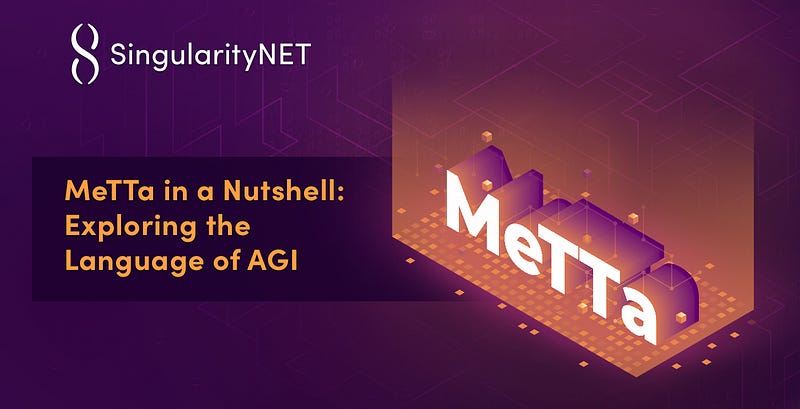
Dear Singularitarians,
On April 30th, 2024, we hosted a special Technical Tuesdays session to celebrate the Alpha release of OpenCog Hyperon.
This milestone introduced several key components, including the MeTTa (Meta Type Talk) language interpreter and the Distributed Atomspace (DAS).
In the session, our panel of SingularityNET experts, featuring CEO Dr. Ben Goertzel, Chief AGI Officer Dr. Alexey Potapov, and CSO Dr. Matt Ikle, explored MeTTas powerful capabilities.
They emphasized how this innovative language enables introspective and self-modifying programs, which are crucial for the recursive self-improvement central to the development of an Artificial General Intelligence (AGI).
MeTTas remarkable flexibility supports neural-symbolic reasoning and adeptly manages uncertainties through probabilistic logical reasoning, making it a standout tool in the world of artificial intelligence. Today, we want to answer some of the questions the broader community might have about the potential of this innovative language to spark new developments in the world of AGI, as well as provide a general overview of MeTTa the programming language of AGI.
Please remember: to learn more about the technicalities behind MeTTa, you can explore its official website. To find out about the larger picture of how MeTTa, DAS, and the overall vision of OpenCog Hyperon fit together can be found at the OpenCog Hyperon website and the Hyperon GitHub repository.
MeTTa stands out from other programming languages due to its focus on declarative and functional computations over knowledge graphs, enabling sophisticated reasoning and representation of complex relationships.
Unlike traditional languages, which may require extensive imperative code to achieve similar goals, MeTTa allows for concise expression of knowledge and logic through its unique constructs.
While MeTTa is part of the Hyperon ecosystem, it can function independently, making it a flexible tool for a variety of applications beyond its intended AI and cognitive architecture context.
MeTTa is designed to support the development of Artificial General Intelligence (AGI) by providing a robust framework for representing and reasoning about knowledge. The main purpose of MeTTa in AGI is to facilitate the creation of systems that can understand, learn, and reason about the world in a human-like manner.
Technical Implementation Details:
While MeTTa provides a powerful framework for representing and reasoning about knowledge, the development of a truly intelligent system requires more than just logical reasoning.
Intelligence in a real-world context also relies on experience and memory, which are essential for learning from experience, as intelligent systems need to adapt based on past interactions and observations.
This requires mechanisms for storing, retrieving, and learning from historical data. Memory enables systems to maintain context over time, which is crucial for understanding complex, dynamic environments. Experience allows intelligent systems to apply learned solutions to new, similar problems, improving efficiency and effectiveness.
True AGI must emulate human cognitive processes, which are deeply rooted in experiential learning and memory. MeTTa, when combined with robust memory systems and experiential learning mechanisms, forms a comprehensive foundation for developing advanced AI and AGI systems that can reason, learn, and adapt in a manner similar to human intelligence.
Ultimately, MeTTa emerges as the ideal language for AGI due to its robust framework that goes beyond traditional programming capabilities. Its declarative and functional approach allows for the sophisticated knowledge representation and reasoning AGI developers require, making it possible to handle complex relationships and data structures. The integration with the Distributed Atomspace (DAS) enhances its suitability for AI applications by providing a versatile knowledge database.
MeTTas multi-paradigm nature, self-reflective capabilities, and advanced pattern matching and unification features offer unparalleled dynamism and flexibility.
These qualities are crucial for creating systems that not only understand and reason about the world in a human-like manner but also adapt and improve through experiential learning and memory.
By enabling introspective and self-modifying programs, MeTTa stands out as the perfect language for advancing toward true Artificial General Intelligence, seamlessly integrating reasoning, learning, and adaptation to mirror human cognitive processes. With the release of MeTTa alpha, we have achieved a big step that moves us closer and closer to achieving the goal of beneficial Artificial General Intelligence.
SingularityNET was founded by Dr. Ben Goertzel with the mission of creating a decentralized, democratic, inclusive, and beneficial Artificial General Intelligence (AGI). An AGI is not dependent on any central entity, is open to anyone, and is not restricted to the narrow goals of a single corporation or even a single country. The SingularityNET team includes seasoned engineers, scientists, researchers, entrepreneurs, and marketers. Our core platform and AI teams are further complemented by specialized teams devoted to application areas such as finance, robotics, biomedical AI, media, arts, and entertainment.
Decentralized AI Platform | OpenCog Hyperon | Ecosystem | ASI Alliance